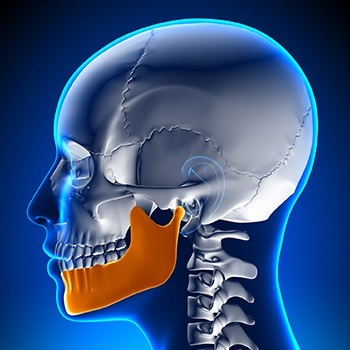
TMJ/TMD Therapy – Allen, TX
Stop needless Jaw Pain and Improve Your Life
When we talk about TMD, were referring to temporomandibular joint disorder. It also refers to a group of disorders that all stem from issues tied to the jaw, the jaw joints, or the facial muscles tied to movement. The temporomandibular joint (TMJ) refers specifically to the small joints located in front of the ear and connects the jaw to the skull. It’s what allows the jaw to make complex movements and function properly. Whenever you talk, chew, or swallow, the TMJ is being used. If any condition prevents these muscles, ligaments, and bones from functioning correctly, it could be due to TMD. We offer TMJ/TMD therapy in Allen, TX to relieve jaw pain and restore function.

Why Choose Allen Smile Design for TMJ/TMD Therapy?
- Occlusal Splints Provided In-House
- Comprehensive Diagnosis and Treatment Available
- Oral Appliances Made with Digital Impression Technology
Types Of Temporomandibular Joint Disorder

TMDS can be put into three different categories.
Muscle Disorders
When you have myofascial pain in the muscles surrounding the jaw joint, it could be a muscle disorder that’s causing the pain or discomfort. This is by far the most common form of TMD.
Joint-Derangement Disorders
If you have a joint-derangement disorder, keep in mind that the disorder is structural, rather than muscular. If you suffered an injury to the lower jaw, wear and tear to the joint as a result of untreated bruxism, or experience excessive jaw movements, it can cause this condition. You can also experience structural issues from a severe malocclusion or dislocation/displacement of the articular disc.
Degenerative/Inflammatory Joint Disorders
When a joint is overused or aging, it can begin to degenerate or inflame. While it could be due to osteoarthritis, it could also be caused by rheumatoid arthritis or a perforated TMJ disc.
It’s also possible for a patient to experience one or more disorders simultaneously.
Causes Of Temporomandibular Joint Disorder

It’s not very clear what causes TMD, however, the symptoms are known to develop from problems with the jaw muscles or the jaw joints. It can be a result of many factors, including:
- A bad “bite” or tooth loss
- Physical trauma to the neck or head
- Grinding or clenching teeth (bruxism)
- Arthritis
- Misalignment of the lower or upper jaw
If you are constantly stressed, it can also play a role in the development of TMD. This is because it can tighten the jaw muscles and cause clenching of the teeth.
Symptoms Of Temporomandibular Joint Disorder

When you have a TMD, it can lead to constant or intermittent pain and discomfort. The most common symptoms include:
- Chronic pain in or near your ear
- Pain in the face, jaw, neck or shoulders
- Having trouble chewing
- Being unable to open the mouth wide
- An uncomfortable bite
- Swelling on one or both sides of your face
- Regular headaches or neck aches
- Popping or clicking noises while opening the mouth
Your symptoms could be hardly noticeable, or they could be so severe that they are impossible to ignore. Keep in mind that the cause of these symptoms could be something other than TMD.
Diagnosis Of Temporomandibular Joint Disorder

With a physical examination and a few tests, we can diagnose TMD. These tests include:
- Detailed X-rays
- Clench test
- MRI scans and CT scans
- Bite analysis
- Joint-vibration analysis
These tests are designed to rule out conditions that may also be causing the same symptoms. This way, we can obtain a clearer diagnosis of your potential TMD.
Treatment For Temporomandibular Joint Disorder

The treatment we prescribe will largely depend on the severity of your condition. We may offer:
- Muscle relaxants
- Low-level laser therapy
- Exercises designed to reduce stress
- Oral appliances to reduce teeth grinding
- Modifying your diet to include more soft foods
- Ice or heat packs
- Avoiding extreme jaw movements
If you require a more extensive treatment, injections might be used to provide pain relief. However, if nonsurgical treatments prove unsuccessful or the joint is damaged, surgery might be necessary. Surgery might include:
- Arthroscopy
- Open joint surgery
- Arthrocentesis
While TMD can be chronic, it can definitely be managed effectively when you have the right treatment plan.
TMJ Treatment FAQs
Can TMD Be Treated Without Surgery?
Yes! Actually, the National Institute of Health recommends using the most conservative methods possible for treatment TMJ dysfunction. When it comes to treating TMD, less is more. Surgery involves making permanent changes to the jaw and nearby anatomy, so it is only ever suggested as a last resort. More often than not, TMD can be treated with less invasive methods. In addition to at-home methods, like stress relief, choosing soft foods, and ice packs, TMD can be alleviated through low-level laser therapy, oral appliances, and injections.
Is TMJ Treatment Expensive?
There are so many different types of TMJ treatment, so the cost can vary a lot. Generally speaking, the more extensive your treatment is, the more it will cost. For instance, getting injections will naturally cost less than jaw surgery. The specific treatment that you need, which impacts the cost, will vary on the cause of your TMD, the severity of your symptoms, and other factors. Insurance may cover TMJ treatment, but this isn’t always the case, so it’s best to confirm this with your provider. Keep in mind that TMJ treatment may seem expensive, but the relief it brings is priceless!
Is TMJ Treatment Safe?
If your TMJ treatment is performed by a qualified professional, the process should be completely safe. Minimally invasive and conservative methods are usually the treatments that are recommended for treating TMJ dysfunction, so several different treatment possibilities will be recommended before undergoing surgery, which always comes with some unlikely risks.
Can TMD Be Cured Permanently?
Discomfort associated with TMJ disorder can subside on its own over time. However, if you find that your symptoms are impacting your everyday life, it’s a good idea to visit a professional for treatment. Some methods, like injections, can result in temporary relief. Other treatments, like oral appliances and surgical treatment are intended to make permanent changes, resulting in long-lasting relief.